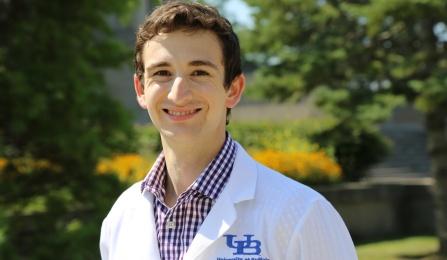
Credit: University at Buffalo
BUFFALO, N.Y. — Postmenopausal women who have experienced loss of all teeth are at higher risk of developing high blood pressure, according to a recent University at Buffalo study published in the American Journal of Hypertension. Multiple studies have suggested an association between periodontal disease and tooth loss with hypertension, but the relationship with time remains unclear with these associations.
Study participants were 36,692 postmenopausal U.S. women from the Women’s Health Initiative-Observational Study. Participants were followed annually from initial periodontal assessment in 1998 through 2015 for newly diagnosed hypertension.
The study observed a positive association between the loss of all teeth and hypertension risk among postmenopausal women. Specifically, these women had approximately 20 percent higher risk of developing hypertension during follow-up compared to women who still had natural teeth. The association was stronger among younger women and those with lower body mass index.
“We are continuing to explore the underlying reasons for the association between tooth loss and hypertension. Future studies on the impact of tooth loss on dietary patterns, inflammation, and the communities of bacteria that live in the mouth may give us further insight into this association,” said Joshua H. Gordon, the paper’s lead author.
Gordon is a graduate student in the MD/PhD Medical Scientist Training Program offered between the School of Public Health and Health Professions (SPHHP) and the Jacobs School of Medicine and Biomedical Sciences at UB.
There are several possible reasons for the observed association. One theory is that tooth loss could lead to changes in dietary patterns that could be associated with higher risk of hypertension. There was no association found between periodontal disease and hypertension.
The study suggests that older women who have lost their teeth may represent a group with higher risk for developing hypertension. As such, the researchers involved in the study believe that improved dental hygiene among those at risk for tooth loss as well as preventive measures such as closer blood pressure monitoring, dietary modification, physical activity, and weight loss may reduce the risk of hypertension.
The findings also suggest that tooth loss may serve as a clinical warning sign for increased hypertension risk.
“These findings suggest tooth loss may be an important factor in the development of hypertension,” said the paper’s senior author, Jean Wactawski-Wende, dean of UB’s School of Public Health and Health Professions. “Further research may help us to determine the underlying mechanisms by which these two common diseases are associated.”
###
Media Contact
David J. Hill
[email protected]
716-645-4651
Original Source
http://www.
Related Journal Article
http://dx.
News source: https://scienmag.com/




